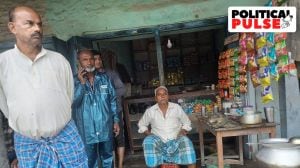Auto-parts group drives into its own sunset
The banks want him. The workers want him. The police — the Central Bureau of Investigation (CBI) no less — want to finalise their ...

The banks want him. The workers want him. The police — the Central Bureau of Investigation (CBI) no less — want to finalise their chargesheet against Paramjeet Singh Patheja, the man who allegedly duped the Bank of India of $29 million. Paramjeet is the youngest of four sons of Man Singh Patheja, the patriarch of a once-prosperous group that was known widely in Europe and the US for its high-quality auto parts, which also found their way into Indian jeeps and cars in the early 1990s.
Yesterday, the Pathejas gained the dubious distinction of being the second group to have assets seized — four flats in Mumbai, a house in Pune was seized earlier — under the powerful new law that allows banks to crack down on defaulters. But the banks aren’t likely to find anything of significant value either in the flats or the factories.
|
EXPERT-TAKE
|
|
‘‘The Act would help banks in reducing any addition to the NPAs. The Act has cut short two steps in the process of recovering NPAs: decree and suit. Access to the assets of the defaulters have become a reality. Story continues below this ad
‘‘The banks should and are being strict in those cases of defaults where the asset values of the company are larger than the outstanding loan. However, the Act does not impact the old cases — the cases that are pending with the debt recovery tribunals and courts.’’ ‘‘It will take time to judge whether the Act is sufficient or some things else needs to be done on the NPA front. The Act has given us some teeth to tackle the problem.’’ ‘‘The Pathejas are not serious in rehabilitating the company nor were they resourceful enough to mobilise the funds required for this purpose.’’ ‘‘We had initiated the recovery measure after the new ordinance was issued (in June). We took over the flats after giving notice and getting an order from the CJM.’’ Story continues below this ad |
Except for the curses of the workers, there has been only silence for the past four years. After finding they had fallen into a deep well of debt, the Pathejas, like most defaulters, first tried to obfuscate their fudged accounts and hide behind legal skirts. After four years of rejecting the Pathejas pleas, the Board of Industrial and Financial Reconstruction (BIFR) ordered the company wound up.
‘‘The promoters are not serious in rehabilitating the company, nor were they resourceful enough to mobilise the funds required for this purpose,’’ the BIFR said. The Indian Express attempted to track down the Pathejas but a week-long search across their factories and residences drew a blank.
Finally, when Paramjeet Patheja was contacted tonight, he said: ‘‘I can reply only in the capacity of an individual and not as part of the management since I walked out of it four to five years back. The case is sub judice. I would only like to say that the (financial) institutions are entitled to exercise their rights as long as they are not vindictive. In the long term perhaps this is good for the country and it will set the individual free.’’
Paramjeet should know. He was picked up by the CBI in December 2001 from an office in South Mumbai, where he was hiding under an alias, Ajit Singh. He was since released on bail. A complaint by another lender had also led to the arrest of father Man Singh and brother Gurvinder from a swank Pune hotel. But their subsequent disappearance seriously hampered punitive action by a consortium of 15 Indian and foreign banks. There are also a slew of creditors who dished out hefty loans to the Pathejas.
It’s been a murky end for a group that like so many other in the list of defaulters, came out of nowhere. The Pathejas worked hard, partied hard and achieved their moments in the sun. Then, they simply self-destructed. Not only did the Pathejas default on bank loans, even on dues to the local municipal corporation alike.
On September 5, 2002, the city officials sealed the Patheja offices for defaulting on Rs 2.86 lakh in civic property tax and other sundry dues. The seals were just a formality—the offices have been closed for four years.
HOW THEY TOOK THE MONEY
The Pathejas borrowed at high interest rates and diverted their stash to acquiring companies and financing investments in real estate. Patheja Forgings and Autoparts Manufacturers Ltd (PFL) started as a backyard factory in 1968, registered as a medium-sized unit in 1975 and went public in 1987. It raised Rs 35.34 crore during the euphoric stock boom of the early 1990s to set up a second unit at Waluj, Aurangabad.
It received export-house status in 1995-96 and increased capacity over the next year. The Patheja Group—the other company was the Patheja Brothers Forgings and Stampings Ltd (PBL)—managed to borrow more than Rs 600 crore from banks and financial institutions in a period of easy money and lax project appraisals. But the glory years were winding down.
Like other defaulter companies, Patheja Forgings began to run out of steam by 1997-98. The IPO market was dead, and it had run through the money it had borrowed. The company was already extracting every bit of restructuring and rescue funds it could wrangle from its creditors. So it declared itself sick and rushed to the BIFR for protection from its creditors in 1998.
During the hearings, the lenders told the BIFR that the company’s problems were mainly due to financial mismanagement, indiscipline and diversion of funds. Also, the company refused to cooperate with a special investigative audit sought by the banks. But as the latest seizure of four flats in Mumbai indicates, it is clear that the Pathejas stashed away money for themselves.
CBI sources explain how the Pathejas took $29 million in foreign currency loans in 1996 to buy machinery. The machinery never arrived. Paramjeet Singh allegedly used the money to pay other liabilities—and simply kept the rest.
|
‘‘IN THE LONG RUN, IT’S
GOOD FOR THE COUNTRY’’ |
|
• When the Express finally managed to track down Paramjeet Patheja, this was what he had to say: ‘‘I can reply only in the capacity of an individual and not as part of the management since I walked out of it four to five years back. The case is sub judice. I would only like to say that the (financial) institutions are entitled to exercise their rights as long as they are not vindictive. In the long term perhaps this is good for the country and it will set the individual free. Regarding whether the banks have given a fair hearing, it is a subjective matter and I would not like to comment on it.’’ Story continues below this ad Earlier, Express reporters went all over Pune and beyond, looking for the Pathejas to get their version of events. This is what they found: |
AND HOW THEY GOT AWAY
The Pathejas followed standard chronic-defaulter procedure. They just used the law and their guile. When the BIFR rejected their application, they appealed to the Appellate authority. The desperate banks tried to take over control of Patheja Forgings Ltd by trying to convert part of the loan to equity: it would mean sacrificing money, but the aim was to get management control. The Pathejas simply ignored the institutional nominee on their board.
In April 1999 the banks tried to take over assets through a high court order, but the company thwarted that move with a simple trick. On the day creditors showed up to take possession of the plant, there was no one on the factory premises. They then lied to the high court, saying it had BIFR protection, and so the legal proceedings were illegal.
By the time the lenders proved to the High Court that the Pathejas were lying, the company had its result for the next year—now it was truly a sick company. The Advocate General did allow the lenders to file a petition for perjury, but it was cold comfort. The BIFR did reject the company’s application in January 2002, saying its accounts were unreliable.
But on the day they received the BIFR order, the Patheja board adopted the next year’s accounts at a hurriedly convened meeting at night—hoodwinking the lone institutional nominee. As morning dawned, they were ready to move the BIFR again.
By the time, the BIFR finally ordered the winding up of the plant, the lenders had little hope of recovering the principal loan, let alone the interest. The plants were shut. A syndicate of banks that had lent the Pathejas foreign exchange, however, was more successful in filing criminal complaints. A CBI press release issued earlier this year accused the two companies of siphoning off Rs 102 crore through two accounts at the Punjab National Bank.
The banks may now begin taking over more factories after the successful seizure on Monday. But as for the Pathejas, it will be a long time before anyone seizes them.



- 01
- 02
- 03
- 04
- 05




























